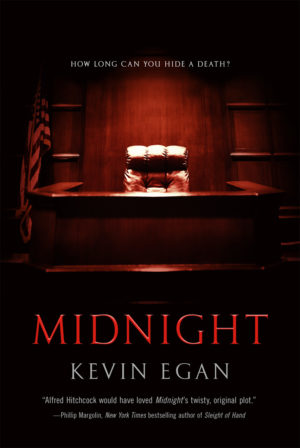
Midnight by Kevin Egan
I’m pleased to welcome author Kevin Egan to VBlog for this installment of Legal Eagles. I first met Kevin a few years ago at a meeting of the Mystery Writers of America, New York chapter. We soon discovered a few things we have in common. Not only are we attorneys who write crime fiction, we also have years of experience working for New York courts and judges. We know what it’s like to juggle a demanding legal career with a passion for fiction writing, squeezing the current work-in-progress into the cracks at either end of the workday and on weekends.
In our careers, we’ve both held positions as judicial law clerks. Don’t be fooled by the word “clerk.” This position is held by an attorney who works closely with a judge in a confidential capacity. While the degree of authority delegated to the law clerk varies from judge to judge, many law clerks exert considerable influence over the court’s decisions.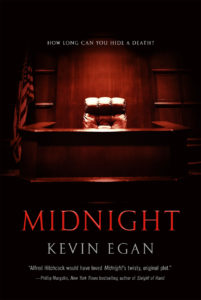
When Kevin explained the premise for his novel Midnight, I had to read it! The unique plot is built around the relationship between a law clerk and his judge in a setting I know very well, the courthouses in lower Manhattan. Unlike many crime novels, Midnight opens not with a murder but with the judge’s death from natural causes, which serves as the catalyst for a series of progressively serious crimes.
You won’t anticipate the many twists and turns in the domino spiral, set in motion by the slowly unfolding secrets of the characters and their conflicting motivations. Tom, the judge’s law clerk, is in debt to a loan shark and feels no serious ethical qualms in rewriting the judge’s opinions to buy his way out of trouble. Carol, the judge’s secretary, carries the financial and emotional weight of caring for her son and her mother while harboring secrets of past sexual affairs. A couple of court officers are anxiously awaiting the judge’s decision in a lawsuit that could abolish their overtime pay. Add to these characters the loan shark’s collection thug, a corrupt union boss, and a brutal mobster, and the resulting web of criminal intrigue spins out of control.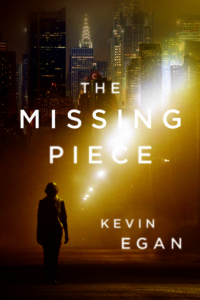
Fans of noir and legal thriller will thoroughly enjoy this compulsively readable tale of desperation and consequence. Legal details are deftly woven into the plot in a way that is easily understood without sacrificing accuracy. Midnight was a Kirkus Best Book of 2013 and is the first of three novels to feature the character Foxx, one of the court officers in the tale. You bet, I’ve put the next two novels on my “to-read” list! They are The Missing Piece (2015), and A Shattered Circle (2017), which received the coveted starred review from Publishers Weekly.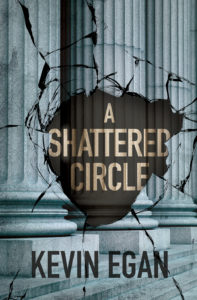
Welcome to VBlog, Kevin! I really enjoyed Midnight. How did you come up with your idea for this novel?
A law clerk and confidential secretary—the standard judicial staff in New York state courts—are personal appointments, which gives the judge free rein to hire and fire without an agency like the EEOC stepping in. However, if a judge dies or retires mid-term, an actual law—Judiciary Law § 36—determines the employment fate of the judge’s staff. It may be an oversimplification, but in dramatic terms, if the judge dies or retires, the staff keep their jobs until the end of that calendar year. So Midnight starts with a premise—what is the worst day of the year for a judge to die? Answer: New Year’s Eve. Tom and Carol’s plan to save their jobs for another year is simple enough: remove the judge’s body from chambers, place him in his bed in his apartment, then begin to “worry” about his failure to return to work until mid-day on January 2. But the plan turns out to be anything but simple.
Do you tend to write an outline first or just take the idea and run with it?
I have published 8 novels, and 7 of them have been written in the “take the idea and run with it” method. The lone exception is Midnight. Midnight first appeared as a short story in the January 2010 issue of Alfred Hitchcock Mystery Magazine. By that point, I was already working on expanding the premise into a novel. It was the only time I created a full outline, which I then followed with only minor deviations. The structure was rigid. It was to cover a period of four days, from December 31 to January 3. Each day presented a problem that Tom and Carol seemingly overcame by nightfall, only to have a more serious problem arise the next day.
Tell us a bit about works by K.J. Egan and Conor Daly. What went into your decision to use pseudonyms? Do you have any advice for writers on this subject?
My first book was a science fiction novel called The Perseus Breed. I started writing a sequel, but then switched to writing what would become a three-book golf mystery series. My agent insisted that I needed a pen name for the mysteries because, in her words, bookstores don’t want the same author on different shelves. And so Conor Daly was born. Having a pen name seemed problematic at the time, though I can’t recall any specifics other than a reader who persisted in writing letters to me as Conan Doyle.
Twelve years intervened between the last Conor Daly book and Where It Lies. By then, I decided to nudge my pen name closer to my real name. There also was a strategy. Since Where It Lies featured a first-person female narrator, I wanted a gender-neutral name on the cover. Using my initials filled that bill.
As for advice, I’ve come to believe that a pen name is a necessary evil. Publishers are much less patient with poor sales, and sales figures now hang onto an author like Jacob Marley’s chains. A pen name can offer a fresh start.
What’s next for you? Is another novel in the works?
I also write short stories. “The Movie Lover,” appearing in the July/August issue of AHMM will be my 26th published short story. I started this year on a short story tear, writing three in the month of January. As for novels, remember that science fiction novel I put down to become Conor Daly? I’ve returned to it.
Thank you for joining me on VBlog, Kevin!
Dear Reader, do you love legal thrillers? Pick up one of Kevin Egan’s books! Also, check out the other entries in the Legal Eagles series on VBlog to learn more about these attorneys who write crime fiction: Manuel Ramos, Allison Leotta, Allen Eskens, Adam Mitzner, Jerri Blair, Brian Clary, and of course, Yours Truly.
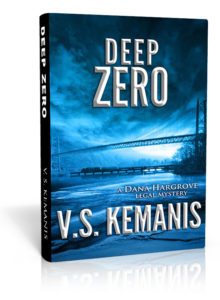
 Once again, thanks to readers and reviewers for a great launch of Deep Zero. If you haven’t read the first three novels, it’s easy to catch up with Dana’s world in the Dana Hargrove Legal Mysteries Collection, available at a discount in ebook and on Kindle Unlimited for free!
Once again, thanks to readers and reviewers for a great launch of Deep Zero. If you haven’t read the first three novels, it’s easy to catch up with Dana’s world in the Dana Hargrove Legal Mysteries Collection, available at a discount in ebook and on Kindle Unlimited for free!




